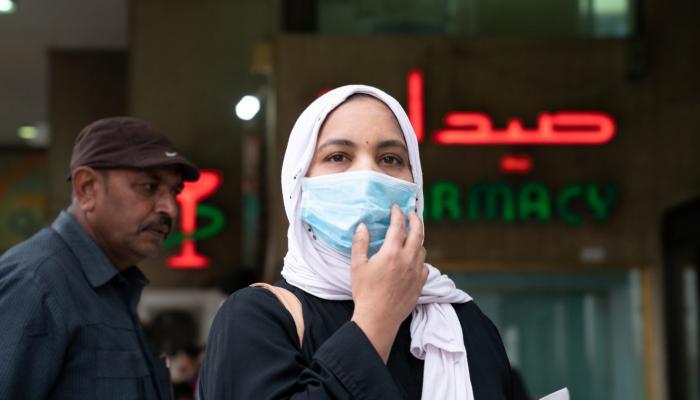Later this month, Egyptian schoolchildren will return from their mid-year break. It will be the first time this year that every local school is functioning normally at the same time—thanks to frequent swine flu-related closures.
As the students resume what is left of their school year, Health Ministry officials are sounding cautiously optimistic that last year’s panic over swine flu (technically known as the H1N1 virus) seems to be fading.
“It’s not over but it’s getting better,” said Dr. Abdel Rahman Shahin, spokesman for the Health Ministry. “We did expect to have a lot of problems. But thank God, it seems to be passing. I think we did very well.”
In total, Egypt reported 16,000 citizens infected with the virus, with a death toll at 265 as of the second week of February.
Considering the absolute panic that engulfed the country last summer and fall, it all seems to be fading with an anti-climactic whimper.
Now the apparent end of the swine flu crisis is prompting a debate over whether it was ever really a crisis in the first place. While Health Ministry officials claim that their ultra-cautious approach is the reason the virus struck Egypt so lightly, critics are charging that the government’s response was an irrational overreaction to a comparatively minor threat.
“They were panicked and that scared the people,” said Dr. Alaa Ghanaam, health programs director for the Egyptian Initiative for Personal Rights.
He cites the frequent school closures in response to infected students that, “ruined the entire educational year,” and last summer’s decision to kill an estimated 300,000 pigs. The mass pig cull in particular, “made Egypt an international joke,” Ghanaam said. He recalls attending a medical conference in the Netherlands last year.
“The first question they asked me was, ‘Why did you do that? What was the justification?’ ”
A former senior Ministry of Health official, Ghanaam expresses personal respect for Health Minister Dr. Hatem el-Gebali, but says that his frequent dire statements last year about the infection rates spreading into the millions simply didn’t match the real size of the threat. Gebali, he said, “was afraid and people could feel it.”
Shahin admits that local officials were “very cautious” in their preventative steps, but denies that the precautions were excessive. He credits Egypt’s vigilance with helping delay the virus’ entrance into the country; the first reported swine flu case in Egypt was in July 2009, several months after the virus had already spread rapidly throughout the world.
The precautions are not over yet, Shahin said, adding that the Ministries of Health and Education will be closely watching the situation in the schools and remain willing to order closures.
“If we get one case in one classroom, we will close the classroom for one week. If we get more than one case in different classes, we will close the school,” he said.
Ghanaam dismisses the total swine flu death toll as equivalent to “one bad train or bus accident.”
He said Egypt’s response to the appearance of swine flu was directly tied to the global breakout of the H5N1 virus (AKA bird flu) several years ago—96 cases were reported in Egypt with 29 deaths. At the time, he said, the government was “accused of neglect” and so they were determined not to be caught off-guard again.
It’s an understandable response, Ghanaam said, but it ignores the medical fact that bird flu is exponentially more dangerous that swine flu. The bird flu virus killed about 60 percent of those infected worldwide. Swine flu, in comparison, spreads much more rapidly from person to person, but kills only about 1 percent of those infected.
Shahin admitted there were some difficulties with the government’s anti-swine flu initiatives. Topping the list of frustrations was widespread public distrust of the government-provided vaccinations.
The Health Ministry rapidly ordered five million doses of the vaccine last year, and placed a priority on vaccinating schoolchildren and pilgrims traveling to Saudi Arabia for the Hajj.
The Hajj vaccinations were a limited success, although there were widespread reports of reluctant pilgrims simply paying compliant Health Ministry employees to receive their vaccination certificate without actually receiving the injection.
Meanwhile the school vaccination program was a complete failure. Shahin said the Health Ministry planned to vaccinate 2.1 million students. Only 25,000 actually received the injection, according to ministry estimates.
“There was resistance from the community,” he said. “Until now we still don’t really know why.”
Easily the hardest thing to justify, in retrospect, was last year’s pig cull—especially since the swine flu virus (unlike bird flu) cannot be transmitted from animals to humans.
In addition to destroying the livelihoods of thousands of farmers, the mass killings also prompted a secondary health crisis. Many of Egypt’s trash collectors or zabaleen are Christians, who used the pigs to help consume the organic waste they collected. The elimination of the pigs prompted more trash than usual to immediately start clogging the streets of the capital.
“Now that we know we’ve been misled, every official who had a role in that holocaust should apologize–first to the pigs, then to the people. The ‘pig holocaust’ has interrupted an established system of garbage collection starting and ending with the pigs,” wrote Al-Masry Al-Youm columnist Suleiman Gouda last month. “Every official in Egypt owes an apology for what the government has done over the last summer, though it might be already too late to make such an apology.”
Shahin refrained from criticizing the decision to eliminate Egypt’s pigs, but implies it was a decision made under stress.
“The whole world was afraid and terrified, at the time," he said.
He also points out that “The (Health Ministry) didn’t play a role in it.”
That decision, he said, came from parliament, along with the agriculture and environment ministries and individual governorates. Also, he said, “The press played a big role.”
Following the bird flu breakout, Shahin explained, a top-level inter-ministerial committee was formed to plan for similar future threats. Doctors at the time cited the looming health threat from pig farms where unsanitary conditions created a breeding ground for future bugs.
Several governorates began making plans to move all pig farming operations outside of heavily populated areas, but the plans were delayed.
Looking back, Shahin says it would have played out differently if plans to transfer the pig farms away from the cities had been completed before last year’s swine flu panic struck.




